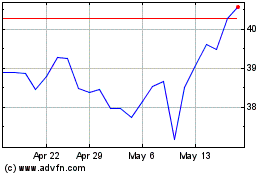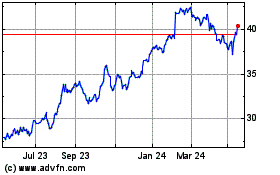By Lukas I. Alpert and Patience Haggin
This article is being republished as part of our daily
reproduction of WSJ.com articles that also appeared in the U.S.
print edition of The Wall Street Journal (August 28, 2020).
Privacy changes in Apple Inc.'s new operating system are sending
ripples through the digital publishing world, with outlets that
rely heavily on advertising bracing for a sizable drop in revenue
from iPhone users.
The upgrade, which is set to roll out this fall, will require
apps to ask users whether or not they want their web activity
tracked. Some publishers worry that most users will opt out,
hobbling their ability to show personalized ads in apps and dealing
them a blow at a time when the industry is trying to recover from
the coronavirus pandemic.
"When every publisher is fighting for every last advertising
cent, this couldn't come at a worse time," said Martin Clarke,
publisher of DMG Media, operator of the Daily Mail and
MailOnline.
Apple's change, which affects collection of Apple's advertising
identifier for users, known as IDFA, also drew criticism from
social-media giant Facebook Inc., which said Wednesday it would
affect the company's multibillion-dollar business of facilitating
ad sales in apps. The new privacy controls will also have an effect
on other ad-technology companies that facilitate ad sales, as well
as makers of apps that sell ads using those intermediaries.
Sheri Bachstein, the global head of consumer business at the
Weather Co., which operates weather.com, estimated that the price
advertisers are willing to pay to advertise within iPhone apps
could decline by as much as 40% as a result of the change. That is
because advertisers generally pay a premium for ads targeted based
on users' interests and behavior on the web.
Apple says it doesn't plan to prohibit tracking, but will simply
require app makers to obtain permission from their users to do
so.
The development comes as tensions between publishers and Apple
have been rising. Last week, a trade group representing thousands
of publishers, including the New York Times, the Washington Post
and The Wall Street Journal, pushed for better terms that would
allow them to keep more money from digital subscriptions sold
through Apple's app store. Dow Jones & Co., publisher of the
Journal and a unit of News Corp, has a commercial agreement to
supply news through Apple services.
In 2017, Apple upgraded its Safari browser to block third-party
cookies -- snippets of code that track users across the web -- by
default, affecting publishers' ability to target advertising.
Earlier this year, Google unveiled plans to implement similar
restrictions in its market-leading Chrome browser by 2022.
DMG's Mr. Clarke said when European regulators implemented
restrictions under a new privacy law, the General Data Protection
Regulation, or GDPR, they left it to publishers to formulate the
language alerting viewers about their privacy rights, but Apple is
forcing everyone to use what he called a "harshly worded
prompt."
The pop-up prompt will state that the app owner "would like
permission to track you across apps and websites owned by other
companies. Your data will be used to deliver personalized ads to
you." In a survey by Tap Research Inc., 85% of respondents said
that if they saw this message in their favorite app, they would
select "Ask App Not to Track."
"This seems aggressively aimed at getting people to opt out,"
Mr. Clarke said. "For Apple to interject itself like this into our
relationship with our readers is outrageous." He said the Mail's
iPhone app draws about 1.2 million viewers a day of its total 16
million average daily users.
"You're almost scaring the consumer into saying, 'Wait a minute.
Am I comfortable with this?'" said Mark Wagman, managing director
at Ascential PLC-owned marketing consulting firm MediaLink.
Alex Austin, chief executive of Branch Metrics Inc., said the
ad-tech company will assume Apple's advertising identifier "is dead
for everything we're doing."
The impact of the coming changes won't be felt uniformly by all
publishers, but could be meaningful for companies that have
"programmatic," or automated ad sales, and have large numbers of
iPhone app users.
"It's by no means life-threatening to us, but for smaller,
independent publishers that are very reliant on programmatic, this
could be really destabilizing," said Peter Spande, publisher and
chief revenue officer of Insider Inc., which publishes Business
Insider.
Jonah Peretti, the CEO of BuzzFeed Inc., said while publishers
may feel some effect in the short term, ultimately the industry
will adjust.
"There are trade-offs for publishers. More direct, contextual
advertising in the long run, but short term it could reduce the
spending of some programmatic advertisers," he said.
Write to Lukas I. Alpert at lukas.alpert@wsj.com and Patience
Haggin at patience.haggin@wsj.com
(END) Dow Jones Newswires
August 28, 2020 02:47 ET (06:47 GMT)
Copyright (c) 2020 Dow Jones & Company, Inc.
News (ASX:NWS)
Historical Stock Chart
From Oct 2024 to Nov 2024

News (ASX:NWS)
Historical Stock Chart
From Nov 2023 to Nov 2024
